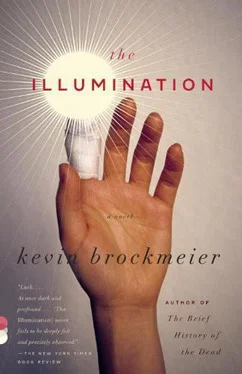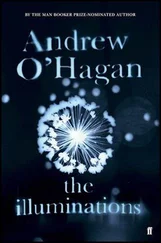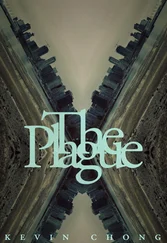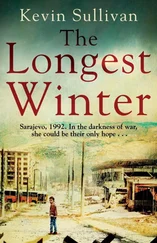His twenty-three days in the hospital were spent watching his bones heal and his scars form, trying to forget who he was and what had happened to him. He couldn’t cough, or even breathe too deeply, without feeling that his ribs were about to split open. Hiccups were a terror. The one time he sneezed, his vision blurred and he nearly passed out. Whenever he shifted his weight, he saw two long serrations of light opening through the thin blue cotton of his exam gown, one across his sternum, another over his left hip. The ballpoint pen had left a small round mark on the white field of his stomach, and he discovered that the seat belt had printed his torso with a crisply bordered bruise, like a soldier’s bandolier, its ammunition sash glinting in the sunlight. Day by day he watched as it turned blue, then green, then spread over his skin in a grotesque yellow stain that gradually lost its shine and color. The radiance that had filtered from his mouth ceased to show as soon as his incisors were capped with porcelain. Suddenly, to his relief, he could pronounce his f ’s and his v ’s again.
It was his kneecap that took the longest time to mend. For nearly two weeks it sent an excruciating silver spike through his leg every time he moved in his harness. Just when it seemed the pain was beginning to abate, his physical therapist decided that the day had come for him to try walking again. She lowered his leg onto the bed and measured him for crutches. “They might be somewhat uncomfortable for you at first,” she cautioned, “but won’t it feel good to leave here on your own two feet? Now hold your horses until I come back,” she said, and he lay there thinking about what it would be like to open his front door, to collect the mail and attempt to revive the plants. The name he had been struggling to ignore rose up inside him and pressed at his lips. Her name is Patricia. Patricia Williford. Patty . Only his long habit of silence and the abrasions lingering in his mouth kept him from repeating it out loud. Soon, the physical therapist returned with a pair of metal crutches. “Chromium,” she said, “with gel polymer tips, the best we have.” She insisted that he test them out. As he wobbled across the room, she carefully laid out her instructions, presenting them one by one like a waiter placing dishes on a table: “Nice and easy, that’s right. Balance yourself on your left leg, your left leg. If it hurts, that means you’re not letting the crutches do the work. You want to avoid placing any weight on that injured knee of yours.” He found that if he ignored her advice, if instead he leaned into the pain when it came, his leg would flood with a glow so strong he was unaware of anything else. For a few seconds, he seemed to be nothing more than the light of that shattered bone, white and expansive, pulsing within its own radiance, and his wife’s name faded entirely from his mind. The agony was nearly indistinguishable from bliss.
Over the days that followed, his pain became increasingly familiar to him. It would come over him when he was reaching for the push-buttons on his bed or crossing the floor to the bathroom, when he was watching the sun bounce off the TV, watching the rain leave its cat’s paws on the window, a response he realized he had been waiting for all along, as if he and his wounds were simply having a conversation at bedtime, interrupted by long moments of insensibility. Oh, yes. Where were we? You were asking me a question, weren’t you? He did not court the sensation, but he did not shrink away from it, either. Whenever he felt it diminishing, a brief feeling of regret settled over him. The fact that he was healing meant that he would be returning to his real life soon. The doctor had reduced his dose of sedatives. The nurse had removed his catheter. His knee had set inside its cage of pins and wires, and though he was still required to wear a brace, he was no longer confined to his harness. On his crutches he felt like an ape swaying across the African veldt, using his long arms to knuckle over the grass.
He was discharged from the hospital on one of those stern late-winter afternoons when a low blanket of rain clouds had turned the sky the color of a blackboard coated with chalk dust. He took a taxi home. As soon as he saw the walnut tree in his front yard slowing outside the window, he asked the driver to help him carry his small parcel of belongings inside. The house was dim and silent. Only a slight humming from the kitchen marked the stillness. He imagined himself pulling a chair across the floor and opening the refrigerator door, sitting in its tidy rectangle of light the way that pioneer families used to gather around a fireplace. It would be a source of comfort in the house, a place where nothing else mattered but his own momentary well-being. Instead, he paid the cabdriver and showed him back outside. He threw the junk mail in the trash and sorted his get-well-soon and sorry-for-your-loss cards into two separate stacks on his desk. He checked his e-mail, deleting the spam from his in-box. Finally he had just enough energy left to water the plants, rotate them, and pick their dead leaves loose before he took himself upstairs for a nap.
Shortly after midnight, he reached out to press his hand against his wife’s back, feeling, as he always did, for the shallow rain-draw of her spinal crease. Then he remembered what had happened. He woke up thirsty and sweating in his blue jeans and went to the kitchen for a ginger ale. On the refrigerator he found the last Post-it note he had left her: I love the spaghetti patterns you leave on the wall . Long ago he had read somewhere that the best way to keep a marriage healthy was to find one new thing you loved about your partner every day. The notion had lingered with him, and so each morning before work he had paused on his way to the car to write her a mash note. There were thousands of them altogether, one for each day of their marriage. I love the shape of your legs inside your brown leather skirt. I love how quietly you speak when you’re catching a cold. I love hearing you tell the cockatoo story to people who don’t know it yet. I love watching you step so carefully inside your footprints when it snows. I love the way you hunt for our names as the movie credits scroll by—“thirteen Jasons and not one Patricia. ”
Usually, by the time the sun came up, he already knew what he was going to write, but on the morning of the accident he had run short of ideas and finally, standing over the stove, had allowed himself to resort to the spaghetti remark. There was one particular note he had been saving for their anniversary, a note he was sure she would like— I love it when you wear my blue jeans, even if you do, too, drip chocolate sauce on them —and if he had known it was their last morning together, the last time she would pad across the linoleum in her thick winter socks, the last time she would open the refrigerator looking for cream for her coffee or jelly for her toast, he would have used it a few months early. At the very least he would have written something more intimate than I love the spaghetti patterns you leave on the wall .
This was what she did: when she wanted to test the spaghetti she was cooking, she would fling a strand against the wall, and if it stuck, she knew it was ready, and if it didn’t, she would try again a few seconds later. Sometimes, after the pot had finished boiling, she would throw an extra strand just for the pleasure of seeing it whip through the air and flatten so suddenly against the plaster. The next day he would find the pieces she had flung hanging over the stove, brittle and yellowed, clinging to the wall in precisely delineated loops and twists that left funny little abstract maps of themselves in the paint when he chipped them loose.
Читать дальше












